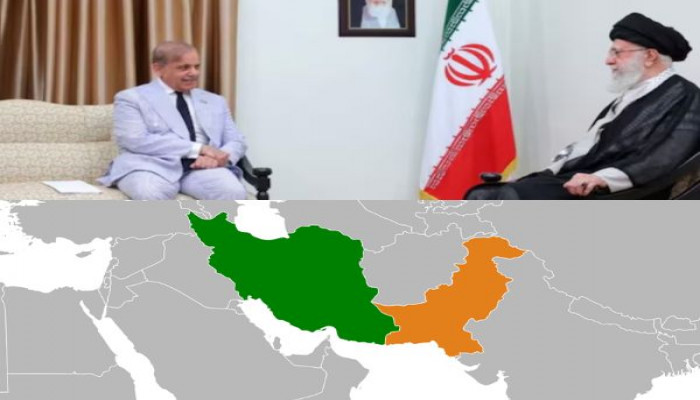Iran and Pakistan mend ties, call for regional peace and unity
- In Reports
- 08:58 PM, May 27, 2025
- Myind Staff
A year after launching airstrikes on each other’s territories, Pakistan and Iran began repairing their relationship. Pakistan Prime Minister Shehbaz Sharif and Chief of Army Staff General Asim Munir travelled to Tehran and met with the Iranian leadership.
Gaza played a key role in bringing the two countries closer. Israel’s brutal counterstrike after the Hamas attacks in October 2023 devastated Gaza. Pakistan referred to its recent tensions with India and the Kashmir issue. Iran’s Supreme Leader Ayatollah Seyyed Ali Khamenei publicly expressed hope that India and Pakistan would resolve their disputes.
Sharif raised the India-Pakistan conflict during his meeting with Khamenei. He referred to India’s airstrikes in Pakistan and Pakistan-occupied Kashmir, which followed the Pahalgam terror attack that killed 26 civilians. The Pakistan Prime Minister appreciated Iran’s “positive role” during the conflict.
In a joint press conference with Iranian President Masoud Pezeshkian, Sharif said that Pakistan was ready to hold talks with India to find solutions to long-standing problems, including Kashmir, water sharing, and trade. He stated, “We are ready to talk, for the sake of peace on water issues with our neighbour. We are ready to talk to promote trade and also, counter-terrorism. We wanted peace, we want peace and we will work for peace in the region through talks, on the table, and resolve our outstanding issues.” He added, “But if they accept my offer of peace, then we will show that we really want peace, seriously and sincerely.”
Iran gave a measured response. Khamenei said on X, “We are delighted with the end of conflicts between Pakistan and India and hope that the differences between the two countries will be resolved.”
Iranian state media IRNA reported that President Pezeshkian expressed support for a durable ceasefire between India and Pakistan. He called for dialogue to resolve disputes and promote peace.
According to a report in The Tehran Times, Khamenei praised Pakistan for not joining the countries normalising ties with Israel, which he described as “a blatant betrayal of the Palestinian cause.” He stated, “While there have been temptations for Islamic countries to engage with the Zionist regime in recent years, Pakistan has never succumbed to these temptations.” He said the issue of Palestine remained the most important concern of the Islamic world. “The situation in Gaza has reached a point where ordinary people in Europe and the United States are protesting their governments, yet unfortunately, some Islamic governments stand alongside the Zionist regime under these circumstances,” he said.
According to The Dawn, Sharif said Israeli actions had caused untold misery for the people of Gaza. He urged the international community to use its influence to bring a lasting ceasefire in Palestine. He added, “Pakistan stands by its brothers and sisters in Iran to promote peace, progress and prosperity.”
In January 2024, Iran conducted airstrikes in Pakistan’s Balochistan province, targeting the terrorist group Jaish al-Adl, which had attacked Iranian border guards earlier. Jaish al-Adl is a Sunni Salafi terrorist group that seeks independence for Iran’s Sistan and Baluchistan province. Pakistan responded with airstrikes in Iran, hitting the militant outfit Baloch Liberation Front.
Amid this backdrop, Sharif’s visit to Tehran marked a thaw in bilateral ties. A global threat assessment report by the US Defence Intelligence Agency stated, “Pakistan and Iran have taken steps, including high-level meetings, to de-escalate tensions after the two countries conducted unilateral airstrikes on each other’s territory in January 2024 in response to cross-border terror attacks.”
Khamenei posted on X that Iran and Pakistan had always shared “warm and brotherly” relations. He added, “Pakistan’s commendable stance during the war Saddam imposed on Iran is a clear example of these brotherly relations.”
Khamenei called for Muslim unity. He said, “At a time when the world’s warmongers have many incentives to create conflicts and wars, the only way to ensure the security of the Islamic Ummah is the unity of Muslim nations.”
On May 9, while tensions between India and Pakistan remained, India hosted Iranian Foreign Affairs Minister Abbas Araghchi for the 20th India-Iran Joint Commission Meeting. Indian External Affairs Minister Dr S Jaishankar co-chaired the meeting. Both countries strongly condemned terrorism in all its forms and manifestations and agreed to strengthen regional cooperation to counter the threat. Dr Jaishankar also briefed Araghchi on Operation Sindoor.
Earlier, after the Pahalgam terror attack, Iran had offered to mediate between India and Pakistan. The Iranian government stated, “India and Pakistan are brotherly neighbours of Iran, enjoying relations rooted in centuries-old cultural and civilisational ties. Like other neighbours, we consider them our foremost priority. Tehran stands ready to use its good offices in Islamabad and New Delhi to forge greater understanding at this difficult time.”
India has consistently maintained that its conflict with Pakistan is a bilateral matter. The Indian government has made it clear to the US and other countries offering to mediate that only one issue remains to be discussed — the return of Pakistan-occupied Kashmir and the handover of terrorists.
India maintained a neutral stance on the Gaza conflict, which has emerged as a point of unity between Iran and Pakistan. In a written reply in the Rajya Sabha, Minister of State for External Affairs Kirti Vardhan Singh stated that India “has always supported a negotiated two-State solution, towards establishment of a sovereign, independent and viable State of Palestine within secure and recognised borders, living side by side in peace with Israel.”
India strongly condemned the October 2023 Hamas attacks in Israel and the loss of civilian lives during the Israel-Hamas conflict. India also called for a ceasefire and sustained humanitarian assistance to Gaza.
Pakistan’s outreach to Iran also came amid Iran’s tensions with the United States over nuclear negotiations. The US is a major defence partner of India. New Delhi will be watching the evolving geopolitics closely before making any strategic move.







Comments